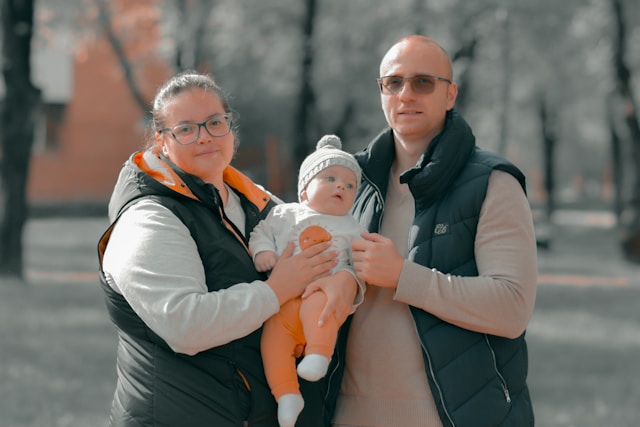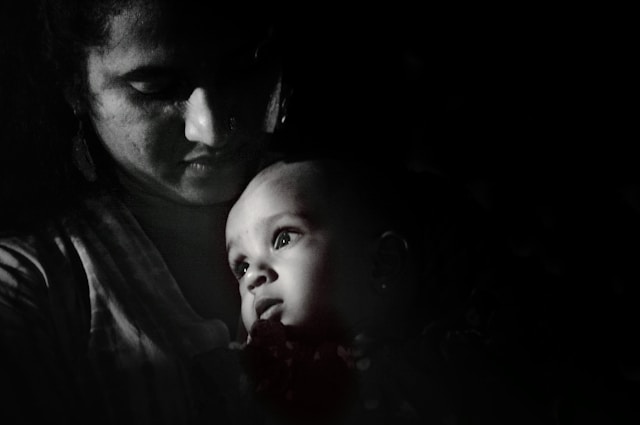We hear about it all the time, the depression many women face after having a baby, called postpartum depression. We see frequent warnings on how to spot it, tips on how to get help for it, and thoughts on how to help someone going through it. And yet as difficult and common as postpartum depression is, other equally difficult conditions are getting brushed under the rug: postpartum anxiety and OCD. They’re shockingly common, and we suspect more common than postpartum depression.
At Life Counseling Institute, some of our therapists in both Willowbrook and Park Ridge specialize in maternal mental health and understand the unique challenges new parents face during this vulnerable time. Whether you’re experiencing postpartum depression, anxiety, or OCD, know that effective treatment is available, and you don’t have to suffer in silence.
Struggling with overwhelming worry or intrusive thoughts after having a baby?
Some of our therapists specialize in maternal mental health and can help you find relief from postpartum anxiety and OCD using proven, evidence-based approaches.
Understanding the difference between postpartum depression and postpartum anxiety
So what is the difference between postpartum depression and postpartum anxiety? Postpartum depression, which goes beyond the typical, short-lived “baby blues”, is characterized by enormous feelings of sadness that don’t go away, a deep ache that cannot be explained. It can sound like this: “I just had a baby. This should be the happiest time of my life. Why am I so sad?” Some moms experience deep regret, questioning whether they should ever have had a baby at all. The days may feel long, tiring, and empty, usually forcing the new mother to question what is wrong with her, why she can’t feel happy during a time that “should” be happy. Of course, postpartum depression can look different for different women. Some may be irritable, angry, or unmotivated.
Postpartum anxiety, on the other hand, usually looks different.
Nonetheless it can be hard to recognize since people frequently haven’t heard of it. The person’s thoughts are filled with “what-ifs,” and they may experience intense worry, feel constantly keyed up and physically on edge, experience panic attacks, and have a general feeling of unease and restlessness. If you’re trying to figure out if you have postpartum depression or anxiety, a key question is: Are you feeling sad and hopeless? Or are you feeling excessively worried and scared? Maybe you’re feeling both. Some women struggle with both postpartum depression and anxiety.
Research from the European Journal of Midwifery shows that postpartum anxiety and depression frequently occur together. In fact, studies have found that at least half of women with postpartum depression also experience anxiety symptoms, and 41% of women with anxiety have co-occurring depression. Yet despite how common these conditions are, many new parents suffer silently, believing they should be able to handle everything on their own or feeling ashamed that they’re struggling during what society tells them should be the happiest time of their lives.
Common symptoms and worries of postpartum anxiety
Women with postpartum anxiety may worry about a range of concerns that can quickly become all-consuming:
The health of the baby.
This worry is particularly common and can result in the mom excessively checking the baby’s breathing, sometimes multiple times per hour, even throughout the night when the baby is sleeping peacefully. They think, “What if she stops breathing in her sleep? What if she gets sick?” These parents may find themselves hovering over the crib, placing their hand on the baby’s chest repeatedly, or waking the baby unnecessarily just to make sure they’re okay. Some parents become hypervigilant about every cough, sneeze, or change in the baby’s coloring, convinced that something terrible is about to happen.
Making mistakes that could harm the baby.
Intrusive “what if” scenarios play on repeat: “What if I accidentally leave the baby in the car? What if I drop them while going down the stairs? What if I forget to secure the car seat properly?” These worries can become so intense that parents develop elaborate checking rituals or avoid certain situations entirely. For example, a parent might check that the car is empty five or six times before going into a store, or they might refuse to carry the baby down stairs without another adult present.
Leaving the baby for even short periods of time in the care of others, even trusted family members or partners.
The anxiety whispers that no one else can care for the baby properly, that something will go wrong the moment they step away. This can make it nearly impossible to take breaks, shower, sleep, or return to work. Some parents experience physical symptoms like panic attacks when they try to leave their baby, even for necessary appointments.
Breastfeeding and feeding concerns.
The mom might constantly question, “Am I producing enough milk?” despite reassurances by the lactation consultant or evidence of the baby’s healthy weight gain. They may pump after every feeding to measure milk output, wake the baby to feed on a rigid schedule out of fear they’re not eating enough, or experience intense guilt and anxiety if supplementing with formula becomes necessary. For some, the pressure to breastfeed successfully becomes a source of relentless anxiety that overshadows the feeding experience entirely.
Whether they are bonding with the baby.
Many new parents worry: “Do I feel the way I’m supposed to feel? Am I bonding properly? What if I don’t love my baby enough?” This worry is especially painful because it strikes at the heart of their identity as a parent. They may scrutinize every interaction, searching for evidence of their bond and panicking when they feel tired, frustrated, or emotionally numb. The anxiety itself can actually interfere with bonding, creating a painful cycle.
Whether they’re doing a good job as a mom.
This manifests as constant second-guessing of every parenting decision: “Should I pick up the baby when they cry or let them self-soothe? Am I creating bad habits? Am I holding them too much or not enough? Is this the right sleep approach, feeding schedule, developmental activity?” Parents may spend hours researching online, reading conflicting advice, and feeling increasingly anxious that they’re somehow failing their child. They compare themselves to other parents and always come up short.
Whether they have ruined their life by becoming a parent.
This thought is often accompanied by intense guilt and shame, but it’s more common than many people realize. Parents think: “What have I done? My life is over. I’ll never have freedom again. I’m trapped.” These thoughts don’t mean they don’t love their baby; rather, they reflect the enormity of the life change and the struggle to integrate their previous identity with their new role as a parent. The anxiety makes it difficult to see that these feelings are temporary and that they will adjust to their new life.
These worries can become all-consuming, interfering with sleep, eating, and the ability to enjoy time with your baby. Physical symptoms often accompany the mental distress, including racing heart, difficulty breathing, muscle tension, insomnia, and digestive issues. Many parents describe feeling like they’re “waiting for the other shoe to drop” or that they’re always on high alert, unable to ever truly relax.
What is postpartum OCD?
Some women experience postpartum OCD (obsessive compulsive disorder), which is surprisingly common yet rarely discussed. Postpartum OCD involves intrusive thoughts, unwanted mental images or urges that seem to come out of nowhere and are deeply distressing to the person experiencing them.
Some examples of intrusive thoughts common in postpartum OCD include:
- Thoughts or mental images of the baby dead
- Thinking, “Maybe I want to harm the baby”
- Thinking, “Maybe I’ll just throw the baby or stab him or her”
- Thinking of putting the baby in the microwave or dryer
- Imagining shaking the baby
- The mom may also experience intrusive images of acting on these thoughts
As you might imagine, having intrusive thoughts or images is highly distressing. It’s important to understand that postpartum OCD, which produces horrific thoughts that are highly distressing to the mom, is distinct from postpartum psychosis, which produces thoughts of harm that are NOT considered horrifying by the mother. With postpartum OCD, these thoughts are ego-dystonic, meaning they go against everything the mother believes and wants. The thoughts are unwanted, intrusive, and cause significant anxiety precisely because they conflict with the person’s values and desires.
Imagine the relief a new mom may feel when they learn that having these thoughts is a well-known anxiety disorder and does not mean they are a terrible mom, and that they won’t act on these thoughts. The International OCD Foundation, which some of our therapists are members of, recognizes this condition. Understanding that postpartum OCD is a recognized condition with effective treatment can be life-changing for someone who has been suffering in silence, terrified of what these thoughts might mean.
Marisa Seper, Licensed Clinical Social Worker (LCSW) and clinical supervisor, who specializes in working with children and families using trauma-informed approaches, emphasizes the importance of addressing the stigma around maternal mental health:
“The shame around maternal mental health can be crippling. It’s crucial for new parents to know that Postpartum OCD is a distinct, treatable condition, often involving disturbing intrusive thoughts. These thoughts are symptoms, not character flaws, and we address them with specialized trauma-informed approaches like EMDR.”
As an EMDR trained therapist who has also completed trust-based relational intervention (TBRI) practitioner training from the Karyn Purvis Institute of Child Development at TCU, Marisa understands how past experiences and trauma can intersect with postpartum mental health challenges.
How postpartum OCD manifests through compulsions
In response to these scary thoughts, the mom usually develops numerous rituals to alleviate the anxiety. These compulsions are behaviors or mental acts that the person feels driven to perform in response to an intrusive thought, with the goal of preventing the feared outcome or reducing distress. Common compulsions in postpartum OCD include:
Excessive cleaning and sanitizing.
This might involve washing hands dozens of times per day until they’re raw, sterilizing bottles and pacifiers repeatedly, changing the baby’s clothes multiple times a day, or cleaning the nursery constantly. The parent believes that if they don’t maintain this level of cleanliness, their baby will get sick or harmed. The cleaning provides temporary relief but ultimately reinforces the anxiety.
Asking for reassurance from others repetitively.
The parent might ask their partner, pediatrician, family members, or even strangers the same questions over and over: “Is the baby breathing okay? Do you think this is normal? Am I doing this right? You would tell me if something was wrong, right?” Even when they receive reassurance, the relief is short-lived, and they feel compelled to ask again. Some parents call the pediatrician’s office multiple times per day or spend hours in online parenting groups seeking reassurance.
Constantly checking on the baby.
This goes beyond the normal monitoring of a newborn. Parents with postpartum OCD might check on their sleeping baby every few minutes, place their hand on the baby’s chest to feel breathing, hold a mirror under the baby’s nose to check for breath, or use multiple baby monitors from different angles. They may wake the baby unnecessarily because the anxiety becomes unbearable. This constant checking disrupts the baby’s sleep, exhausts the parent, and reinforces the belief that the baby is in constant danger.
Avoiding any “risky” items such as knives or stairs.
The parent might remove all knives from the kitchen, refuse to go near balconies or windows, avoid bathing the baby out of fear of drowning, or refuse to be alone with the baby near stairs. Some parents avoid driving with the baby or taking them out of the house. While these behaviors temporarily reduce anxiety, they significantly limit the parent’s ability to function and care for their baby normally.
Conducting exhaustive Google searches about baby safety and health.
The parent might spend hours each day searching for information about SIDS, developmental milestones, illness symptoms, or parenting advice. They may research rare diseases or accidents, which only increases their anxiety. This compulsive research provides an illusion of control but actually feeds the anxiety cycle.
Repeatedly reviewing memories to make sure they didn’t harm the baby.
The parent might mentally replay interactions with the baby over and over, searching for evidence that they didn’t hurt them. “Did I support the head properly? Was the water temperature okay? Did I close the car door on their hand?” This mental reviewing can be exhausting and time-consuming.
Mental compulsions like counting, praying, or repeating phrases.
Some parents develop internal rituals that others can’t see, such as counting to a certain number, saying prayers or phrases silently, or “undoing” a bad thought with a good thought. These mental compulsions can be just as time-consuming and distressing as visible compulsions.
These compulsions provide temporary relief from the anxiety caused by intrusive thoughts, but they ultimately reinforce the OCD cycle, making the condition worse over time. The brain learns that the only way to feel better is to engage in the compulsion, which strengthens the power of the intrusive thoughts. At both our Willowbrook and Park Ridge locations, and via telehealth, we help parents understand this cycle and break free from it using evidence-based treatment approaches, particularly ERP therapy.
The impact of postpartum anxiety and OCD
Postpartum anxiety and OCD cause the mom to suffer greatly at what is already one of the most difficult times in a woman’s life. The mom may experience:
- Extreme worry that feels impossible to control
- Physical activation and tension
- Inability to relax, even when the baby is sleeping
- Irritability and mood swings
- Racing heart and shortness of breath
- Insomnia, even when exhausted
- Being overly cautious or controlling with the baby
- Avoiding things that cause anxiety
- Difficulty bonding with the baby
- Feelings of shame, guilt, or inadequacy
- Isolation from friends and family
These symptoms don’t just affect the mother. They can impact the entire family system, including partners, other children, and extended family members. The good news is that with proper treatment and support, recovery is not only possible but expected.
What causes postpartum anxiety and OCD?
All three conditions (postpartum depression, anxiety, and OCD) can be brought on by numerous factors. The hormonal changes of pregnancy and delivery can be factors, as can a prior history of anxiety or OCD. Research has found that some women appear to be particularly sensitive to the effects of hormonal changes during pregnancy and postpartum; when exposed to identical hormonal conditions in a controlled study, women with a history of postpartum depression experienced mood changes while women without such history remained stable, suggesting a biological vulnerability in certain individuals.
- Sleep deprivation and physical exhaustion
- Major life transition and identity shift
- History of trauma or difficult birth experience
- Lack of social support
- Pressure to be a “perfect” parent
- Previous mental health challenges
- Family history of anxiety or OCD
- Stressful life circumstances
In communities like Park Ridge and Willowbrook, where expectations for parenting can be particularly high, new parents may feel additional pressure to appear as though they have everything under control. This pressure can make it even harder to reach out for help when struggling with maternal mental health concerns.
Finding postpartum OCD counseling in Park Ridge and Willowbrook
If you recognize yourself in any of these descriptions, please know that you’re not alone and that help is available. At Life Counseling Institute, we provide specialized postpartum OCD counseling in Park Ridge, as well as comprehensive maternal mental health therapy in Willowbrook and throughout the Chicago suburbs.
Our therapists understand the unique challenges of postpartum mental health conditions. We know that reaching out for help when you’re already exhausted and overwhelmed can feel impossible. That’s why we offer both in-person sessions and secure telehealth appointments that allow you to meet with your therapist from the comfort of your home.
When you begin postpartum OCD counseling or treatment for postpartum anxiety, your therapist will start by conducting a thorough assessment to understand your specific symptoms, triggers, and circumstances. From there, we’ll develop a personalized treatment plan that may include:
- Psychoeducation: Understanding what you’re experiencing and why is often the first step toward relief
- Cognitive restructuring: Learning to identify and challenge anxious thoughts
- Exposure and Response Prevention (ERP): The gold-standard treatment for OCD
- Behavioral activation: Gradually re-engaging with activities that bring meaning and joy
- Stress management techniques: Building your capacity to cope with the inevitable stresses of new parenthood
- Support for partners and family: Helping your support system understand how to help
Many of our clients report feeling significantly better within the first few sessions, simply from understanding what they’re experiencing and learning that they’re not alone. With continued treatment, most parents experience substantial relief from their symptoms and are able to enjoy their baby and their new role as a parent.
Effective postpartum OCD counseling and maternal mental health therapy
Fortunately, all forms of postpartum anxiety are highly treatable. Counseling by a therapist trained in cognitive-behavioral therapy (CBT) can help enormously. CBT helps you identify and change the thought patterns and behaviors that maintain anxiety. You’ll learn skills for responding differently to anxious thoughts and physical sensations, breaking the cycle that keeps you stuck.
For postpartum OCD, a form of therapy called exposure and response prevention (ERP) is critical. ERP is the gold-standard treatment for OCD and involves gradually facing feared situations while resisting the urge to engage in compulsions. This might sound scary, but it’s done gradually and collaboratively, with your therapist supporting you every step of the way. Over time, ERP helps your brain learn that the feared outcomes won’t actually happen, and that you can tolerate the discomfort of uncertainty.
Our therapists also integrate other therapeutic approaches as needed, including:
- Acceptance and Commitment Therapy (ACT): Helps you develop a different relationship with difficult thoughts and feelings
- EMDR (Eye Movement Desensitization and Reprocessing): Particularly helpful for processing birth trauma or other traumatic experiences
- Mindfulness-based techniques: Support present-moment awareness and reduce reactivity to anxious thoughts
- Supportive counseling: Provides a safe space to process the challenges of new parenthood
Medications may also be helpful, and women should speak to their physician about which medications are best if they are breastfeeding. Many medications are compatible with breastfeeding, and your doctor can help you weigh the risks and benefits.
When to seek professional support for postpartum anxiety
Pregnancy and recent motherhood are difficult enough without these issues. If you’re suffering from postpartum depression, anxiety, or OCD, reach out for help as soon as possible to prevent the condition from worsening.
You should consider seeking postpartum OCD counseling or support for postpartum anxiety if:
- Your worry or intrusive thoughts are interfering with daily functioning
- You’re avoiding activities or situations because of anxiety
- You’re unable to sleep even when you have the opportunity
- You’re experiencing frequent panic attacks
- Physical symptoms like racing heart or shortness of breath are common
- You’re checking excessively (on the baby, locks, cleanliness, etc.)
- You’re seeking constant reassurance from others
- You’re having intrusive thoughts that frighten or disturb you
- Your anxiety is affecting your relationship with your baby or partner
- You’re feeling isolated or ashamed about what you’re experiencing
Remember that seeking help is a sign of strength, not weakness. With support and specific treatment for your anxiety, you can experience motherhood as the joy you had always hoped for.
Our therapists provide specialized maternal mental health therapy with convenient telehealth options available for parents across Illinois who may find it difficult to leave home with a new baby.
Frequently Asked Questions About Postpartum Anxiety and OCD
How common are postpartum anxiety and OCD compared to postpartum depression?
While postpartum depression affects approximately 10 to 15 percent of new mothers in the US, UK, and Australia, research published in the International Journal of Women’s Health suggests that postpartum anxiety may be equally or more common (Fitelson et al., 2011). A recent study of postpartum women in Spain found that nearly half experienced some level of anxiety symptoms, with over a third experiencing mild anxiety and about 11 percent experiencing moderate to severe anxiety (Díaz Ogallar et al., 2025). Anxiety disorders in the perinatal period commonly occur alongside depression and may include obsessive-compulsive symptoms, generalized anxiety, panic disorder, or post-traumatic stress disorder (Fitelson et al., 2011). The reality is that any new parent can experience postpartum mental health challenges, yet we don’t talk about postpartum anxiety and OCD nearly as much as we discuss postpartum depression. This lack of awareness means many people suffer silently, not realizing that what they’re experiencing has a name and is highly treatable.
Will having intrusive thoughts about my baby mean I’ll act on them?
Absolutely not. This is one of the most important things to understand about postpartum OCD. The intrusive thoughts are distressing precisely because they go against everything you believe and want as a parent. People with postpartum OCD are not dangerous to their babies. In fact, research shows that individuals with OCD who have violent intrusive thoughts are less likely to act on them than the general population. The thoughts are symptoms of an anxiety disorder, not desires or impulses. The fear and horror you feel about these thoughts is evidence that you would never want to act on them. If you’re experiencing intrusive thoughts, please reach out for help. A therapist trained in treating postpartum OCD can help you understand that these thoughts don’t define you, and ERP therapy can help you break free from the distressing cycle of intrusive thoughts and compulsions.
Can fathers or non-gestational parents experience postpartum anxiety or OCD?
Yes, absolutely. While postpartum depression and anxiety are most commonly discussed in relation to birthing mothers due to the hormonal changes of pregnancy and childbirth, any new parent can experience postpartum mental health challenges. Research shows that 1 in 10 fathers struggle with postpartum depression and anxiety, with the highest risk for paternal postpartum depression occurring when babies are 3 to 6 months old (UT Southwestern Medical Center, 2021). Fathers may experience hormonal changes during and after their partner’s pregnancy—particularly declines in testosterone—which can contribute to mood changes. Additionally, up to half of men whose partners experience postpartum depression show signs of depression themselves.
Paternal postpartum anxiety and depression can manifest differently than in mothers, often appearing as irritability, anger, increased risk-taking behavior, withdrawal from relationships, or working significantly more or less than usual rather than traditional symptoms like sadness or crying (UT Southwestern Medical Center, 2021). Non-gestational parents in same-sex relationships or adoptive parents can also experience anxiety and OCD related to the major life transition of becoming a parent. The stress, sleep deprivation, identity shift, and increased responsibility affect all parents, regardless of whether they gave birth. At Life Counseling Institute, we work with all parents struggling with postpartum mental health concerns, and we create an inclusive, affirming therapeutic environment.
How long do postpartum anxiety and OCD typically last without treatment?
Without treatment, postpartum anxiety and OCD can persist for months or even years, sometimes developing into chronic anxiety disorders. Some research suggests that untreated postpartum anxiety can continue well beyond the first year postpartum and may evolve into generalized anxiety disorder or other anxiety conditions. However, the good news is that with proper treatment, most people experience significant improvement within a few months. Cognitive Behavioral Therapy and Exposure and Response Prevention are highly effective treatments with strong research support. The sooner you seek help, the sooner you can start feeling better. Many parents report that they wish they had reached out for support earlier rather than trying to tough it out on their own. If you’re struggling, please don’t wait. Some of our licensed therapists specialize in maternal mental health and can provide the support you need.
Is medication necessary to treat postpartum anxiety and OCD?
Not always, but it can be very helpful for some people. The decision to use medication is a personal one that should be made in consultation with your doctor and therapist. Research shows that therapy alone, particularly Cognitive Behavioral Therapy and ERP, can be highly effective for postpartum anxiety and OCD. However, some people benefit from the combination of therapy and medication, especially if symptoms are severe or if they have a history of anxiety or OCD that predates pregnancy. If you’re breastfeeding, many medications are considered safe, and your doctor can help you understand the options and make an informed decision. What’s most important is that you get help in some form. Even if you’re unsure about medication, starting therapy is an important first step. Your therapist can work collaboratively with you and your physician to determine the best treatment approach for your specific situation.
Will my anxiety or OCD affect my ability to be a good parent?
Having postpartum anxiety or OCD doesn’t make you a bad parent. In fact, many parents with these conditions are incredibly devoted and loving. The anxiety often reflects deep care and concern for your baby’s wellbeing, even though it manifests in ways that are distressing and unhelpful. What’s important is getting treatment so that the anxiety doesn’t interfere with your ability to enjoy parenthood and bond with your baby. Research shows that when maternal mental health conditions are treated effectively, outcomes for both parent and child are excellent. Many parents find that going through treatment actually makes them stronger, more self-aware, and better equipped to model healthy emotional regulation for their children. Seeking help is one of the best things you can do for both yourself and your baby.
How can I support a partner or loved one who is experiencing postpartum anxiety or OCD?
Supporting a loved one with postpartum anxiety or OCD starts with education, validation, and encouragement. Learn about these conditions so you understand what your partner or loved one is experiencing. Validate their feelings without minimizing their distress or telling them to “just relax” or “not worry so much.” Encourage them to seek professional help and offer to support them in finding a therapist, attending appointments, or researching treatment options. Practical support is also crucial: help with childcare, household tasks, and ensuring they get opportunities to sleep and take breaks. Don’t take their irritability or anxiety personally; remember that these are symptoms of a treatable condition, not reflections of their feelings about you or your relationship. If they’re experiencing intrusive thoughts, understand that these thoughts are symptoms of OCD and don’t reflect who they are as a person or parent. Finally, take care of your own mental health as well. Supporting someone with a postpartum mental health condition can be challenging, and you may benefit from your own therapy or support group. Our therapists can provide guidance for partners and family members as well.
Ready to Get Help?
If you’re struggling with postpartum anxiety, OCD, or depression, our team at Life Counseling Institute is here to help. We offer both in-person and telehealth counseling throughout Illinois.
You Might Also Find it Helpful to Read:
- Coping with Postpartum Depression and Anxiety
- Are You Enabling Your Child’s Anxiety?
- Yucky Thoughts and What to Do About Them
Citations:
- Díaz Ogallar, M. A., Martinez Vazquez, S., Hernández Martínez, A., Peinado Molina, R. A., & Martínez Galiano, J. M. (2025). Prevalence and associated factors of anxiety in postpartum women. European Journal of Midwifery, 9, 28. https://doi.org/10.18332/ejm/204308
- Schiller, C. E., Meltzer-Brody, S., & Rubinow, D. R. (2015). The role of reproductive hormones in postpartum depression. CNS Spectrums, 20(1), 48–59. https://doi.org/10.1017/S1092852914000480
- Fitelson, E., Kim, S., Baker, A. S., & Leight, K. (2011). Treatment of postpartum depression: Clinical, psychological and pharmacological options. International Journal of Women’s Health, 3, 1–14. https://doi.org/10.2147/IJWH.S6938
- UT Southwestern Medical Center. (2021, August 17). 1 in 10 dads experience postpartum depression, anxiety: How to spot the signs. Your Pregnancy Matters. https://utswmed.org/medblog/postpartum-depression-anxiety-dads/









